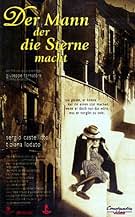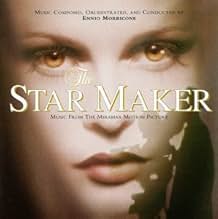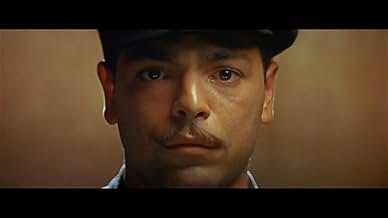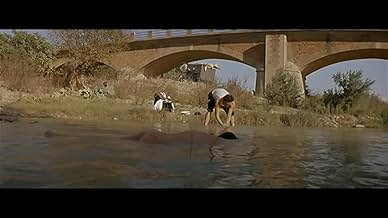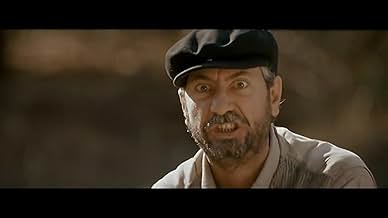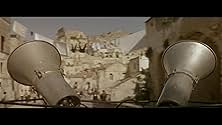IMDb RATING
7.3/10
5.7K
YOUR RATING
A photographer and the types of people he encounters.A photographer and the types of people he encounters.A photographer and the types of people he encounters.
- Nominated for 1 Oscar
- 13 wins & 16 nominations total
Featured reviews
I love reading the comments by the I assume female writers who took time to critique this film. All universally saying the same thing, that the sex is either superfluous or if relevant demeaning to women. Of course its demeaning to women, it was intended to be. The guy is a rat bastard, thats what the film is all about. This film takes place a long time ago in a place that still would be considered backwards. I don't understand what people expect to see, but i assume its because they are fed a steady diet of Hollywood nonsense and have been for so long, that anything that isn't the false matriarchal utopia Hollywood longs for as a reality in life, upsets them greatly. Get over it already please. This film isn't any sort of great achievement, but it is sucessful in portraying rather accuratly conditions in post war Italy. Womens attitudes in Europe differ greatly than that of their American counterparts, and probably always will. They are as equally mystified by the total desexualization of our modern American society, as we are by their willingness to openly confront issues we deem taboo.
A fast-talker rolls through postwar Sicily selling the dream of movie stardom, and in the process uncovers the desires and desperation of the townspeople. Like a patent medicine salesman, he seduces them with the magic of cinema, more potent than anything from a bottle.
Be prepared for the movie to seduce you, too, with its gorgeously chiseled Sicilian landscapes and faces viewed through the soul-baring lens. It gives a good view of the toughness of Sicily, and every frame has a visual richness typical of Italy itself. If you listen hard, you can make out the Sicilian accent -- even if you don't speak Italian. You'll be able to predict some of what happens, but not all, and the characters and their profiles will linger with you longer than you might expect.
Be prepared for the movie to seduce you, too, with its gorgeously chiseled Sicilian landscapes and faces viewed through the soul-baring lens. It gives a good view of the toughness of Sicily, and every frame has a visual richness typical of Italy itself. If you listen hard, you can make out the Sicilian accent -- even if you don't speak Italian. You'll be able to predict some of what happens, but not all, and the characters and their profiles will linger with you longer than you might expect.
Emotions of enthusiasm break down in sensitive portraits of poor Sicilians who reveal their inner self in two minutes they have in front of a camera. Realism all the way and yet i had to think of the enthusiasm Kusturica had in Black Cat White Cat although none of the characters are that absurd. If you see European movies like this after all the American commercial rubbish you get a glimpse of what film can give us! Good acting and writing, beautiful locations, a lot of strong character studies and very, very impressive camera work. Absolutely not a waste of your time!
Joe Morelli is a scam artist that loves to prey on innocent people in the poorer regions of Italy. As we meet him, he is trying to swindle whoever he can from the impoverished Sicilians that happen to live in those forgotten towns. The movie is set after WWII in a ruined Italy that hasn't come out of its defeat and most of the population is having a hard time eking a life, mainly from the land.
Morelli, pretending to be a scout for a big Rome studio is seen traveling the back ways of Sicily with his small van that opens up to a mini studio where the unsuspecting people of those towns flock for a screen test that no one will ever see. For the price of 1,500 lire they get a chance to act for the con man and his camera, hoping they will be the next discovery, once the film is seen by the big casting directors in Rome.
Giuseppe Tornatore has a love for the cinema, as he showed with "Nuovo cinema Paradiso", which chronicled, perhaps, his own childhood in a small town in Sicily. Mr. Tornatore is a director that hasn't forgotten his roots, as he demonstrates with this tale about innocent common people being duped because their love and the allure of the cinema, that dream making medium.
Sergio Castellitto, one of the best actors working today in the Italian cinema, does a wonderful job interpreting Morelli for the director. His Morelli is never mean, or nasty; in fact, one of his best qualities is the way how he bonds with his subjects. Mr. Castellitto does wonders as the man without scruples, who eventually is found by one person who he made a fool of. Also, Morelli finds in Beata, the sweet and innocent girl from a convent a love he never knew he was capable of having.
Beata, is played by Tiziana Lodato, a beautiful young actress who is the one that makes Morelli understand his guilt after he is beaten and young Beata is interned in an institution. Leopoldo Trieste is seen as the mysterious figure who comes to recite a Spanish text for his screen test. Franco Scaldatto has some good moments in the film.
This is a film that will not disappoint fans of Giuseppe Tornatore because of his vision about people love for the cinema.
Morelli, pretending to be a scout for a big Rome studio is seen traveling the back ways of Sicily with his small van that opens up to a mini studio where the unsuspecting people of those towns flock for a screen test that no one will ever see. For the price of 1,500 lire they get a chance to act for the con man and his camera, hoping they will be the next discovery, once the film is seen by the big casting directors in Rome.
Giuseppe Tornatore has a love for the cinema, as he showed with "Nuovo cinema Paradiso", which chronicled, perhaps, his own childhood in a small town in Sicily. Mr. Tornatore is a director that hasn't forgotten his roots, as he demonstrates with this tale about innocent common people being duped because their love and the allure of the cinema, that dream making medium.
Sergio Castellitto, one of the best actors working today in the Italian cinema, does a wonderful job interpreting Morelli for the director. His Morelli is never mean, or nasty; in fact, one of his best qualities is the way how he bonds with his subjects. Mr. Castellitto does wonders as the man without scruples, who eventually is found by one person who he made a fool of. Also, Morelli finds in Beata, the sweet and innocent girl from a convent a love he never knew he was capable of having.
Beata, is played by Tiziana Lodato, a beautiful young actress who is the one that makes Morelli understand his guilt after he is beaten and young Beata is interned in an institution. Leopoldo Trieste is seen as the mysterious figure who comes to recite a Spanish text for his screen test. Franco Scaldatto has some good moments in the film.
This is a film that will not disappoint fans of Giuseppe Tornatore because of his vision about people love for the cinema.
Joe Morelli (Sergio Castellitto) is a flimflam man who is driving around the rural villages of Sicily shortly after World War II selling potential stardom for fifteen hundred lira. He has a motion picture camera and loudspeaker on his truck. As he drives through the villages he broadcasts to the people that he is from the film industry of Roma and he is giving screen tests in order to discover natural talent.
He sets up his truck and tent typically in the town square. His technique is to tell everyone that they have a wonderful face, hidden talent, that they are naturals and diamonds in the rough. He hands out fliers with some dialogue from "Gone with the Wind" on them that they should practice reading before appearing before his camera. He has discovered that people will fall for his flattery and pay him for the fake screen tests.
As we watch the film we discover that people will put their hearts and souls into the experience of appearing before his camera. They don't just read the lines from Gone with the Wind. They tell their life stories in miniature. They bare their hearts and souls to the flimflam man in the hope that someone will hear and see their anguish, their pain, their experience. To Morelli, who has been to Hollywood and failed, this is just a way to make a lira. He has a gift for the hustle and is blind to the real emotion that he evokes.
A woman believes his teenaged daughter has the talent to make it in the movies. She begs Morelli to take her to Roma. She even has sex with him and promises to allow him to be her daughter's first lover. But Morelli moves on to the next town. He is stopped by the local police chief, but Morelli manages to flatter him into appearing before his camera and then applauds the chief's performance. Three highwaymen stop to rob Morelli. He is able to convince them that Roma longs for their raw talent. And so on, as he travels over the cobblestones and over the winding roads.
Finally he meets beautiful Beata (Tiziana Lodato) who is 15 or 18. She isn't sure. She works in the convent, bathing the sick and scrubbing the floors. She exposes herself to the local tax man to raise the 1500 lira needed for Morelli's screen test. She is strikingly beautiful from head to toe, and the tax man exclaims, "You are a statue!" when he sees her body. Morelli is reluctant to get involved with someone so young even though she throws herself at him.
What happens after this I will not say since it would spoil the film for those who have not seen it. But watch for the con man to get conned, among other things. Despite his villainy, there is a sense that Morelli is a man that we can identify with and understand. I think it is this quality that director Giuseppe Tornatore has developed in his character that carries the film, and Sergio Castellitto whom I saw recently in Non ti muovere (Don't Move) (2004) really becomes the part.
Tornatore, who made a splash with the critically acclaimed Cinema Paradiso (1988) wrote the original material here and worked on the script in addition to directing. While I thought Cinema Paradiso was an excellent film, I liked this one even more. Both are original works of art, but I found L'uomo delle stelle more engaging. Particularly striking are the beautiful village scenes, the faces of the people, and the photography of the Sicilian countryside and ruins.
(Note: Over 500 of my movie reviews are now available in my book "Cut to the Chaise Lounge or I Can't Believe I Swallowed the Remote!" Get it at Amazon!)
He sets up his truck and tent typically in the town square. His technique is to tell everyone that they have a wonderful face, hidden talent, that they are naturals and diamonds in the rough. He hands out fliers with some dialogue from "Gone with the Wind" on them that they should practice reading before appearing before his camera. He has discovered that people will fall for his flattery and pay him for the fake screen tests.
As we watch the film we discover that people will put their hearts and souls into the experience of appearing before his camera. They don't just read the lines from Gone with the Wind. They tell their life stories in miniature. They bare their hearts and souls to the flimflam man in the hope that someone will hear and see their anguish, their pain, their experience. To Morelli, who has been to Hollywood and failed, this is just a way to make a lira. He has a gift for the hustle and is blind to the real emotion that he evokes.
A woman believes his teenaged daughter has the talent to make it in the movies. She begs Morelli to take her to Roma. She even has sex with him and promises to allow him to be her daughter's first lover. But Morelli moves on to the next town. He is stopped by the local police chief, but Morelli manages to flatter him into appearing before his camera and then applauds the chief's performance. Three highwaymen stop to rob Morelli. He is able to convince them that Roma longs for their raw talent. And so on, as he travels over the cobblestones and over the winding roads.
Finally he meets beautiful Beata (Tiziana Lodato) who is 15 or 18. She isn't sure. She works in the convent, bathing the sick and scrubbing the floors. She exposes herself to the local tax man to raise the 1500 lira needed for Morelli's screen test. She is strikingly beautiful from head to toe, and the tax man exclaims, "You are a statue!" when he sees her body. Morelli is reluctant to get involved with someone so young even though she throws herself at him.
What happens after this I will not say since it would spoil the film for those who have not seen it. But watch for the con man to get conned, among other things. Despite his villainy, there is a sense that Morelli is a man that we can identify with and understand. I think it is this quality that director Giuseppe Tornatore has developed in his character that carries the film, and Sergio Castellitto whom I saw recently in Non ti muovere (Don't Move) (2004) really becomes the part.
Tornatore, who made a splash with the critically acclaimed Cinema Paradiso (1988) wrote the original material here and worked on the script in addition to directing. While I thought Cinema Paradiso was an excellent film, I liked this one even more. Both are original works of art, but I found L'uomo delle stelle more engaging. Particularly striking are the beautiful village scenes, the faces of the people, and the photography of the Sicilian countryside and ruins.
(Note: Over 500 of my movie reviews are now available in my book "Cut to the Chaise Lounge or I Can't Believe I Swallowed the Remote!" Get it at Amazon!)
Did you know
- TriviaTiziana Lodato's debut. She has full nude scenes and when filming began (september 1994), she was still a minor. But she said she was already 18 when she played the explicit sex scene with Sergio Castellitto. However her mother was upset. "She absolutely did not want me to make the film, although everyone reassured her by telling her Tornatore is an important director, he won the 'Oscar', but she did not give a damn. She said: my daughter's nude scenes, no. In the end I convinced her," Lodato said.
- Quotes
Joe Morelli: We are here to offer you a fantastic future!
- How long is The Star Maker?Powered by Alexa
Details
Box office
- Gross US & Canada
- $371,674
- Opening weekend US & Canada
- $40,915
- Mar 10, 1996
- Gross worldwide
- $371,674
Contribute to this page
Suggest an edit or add missing content


